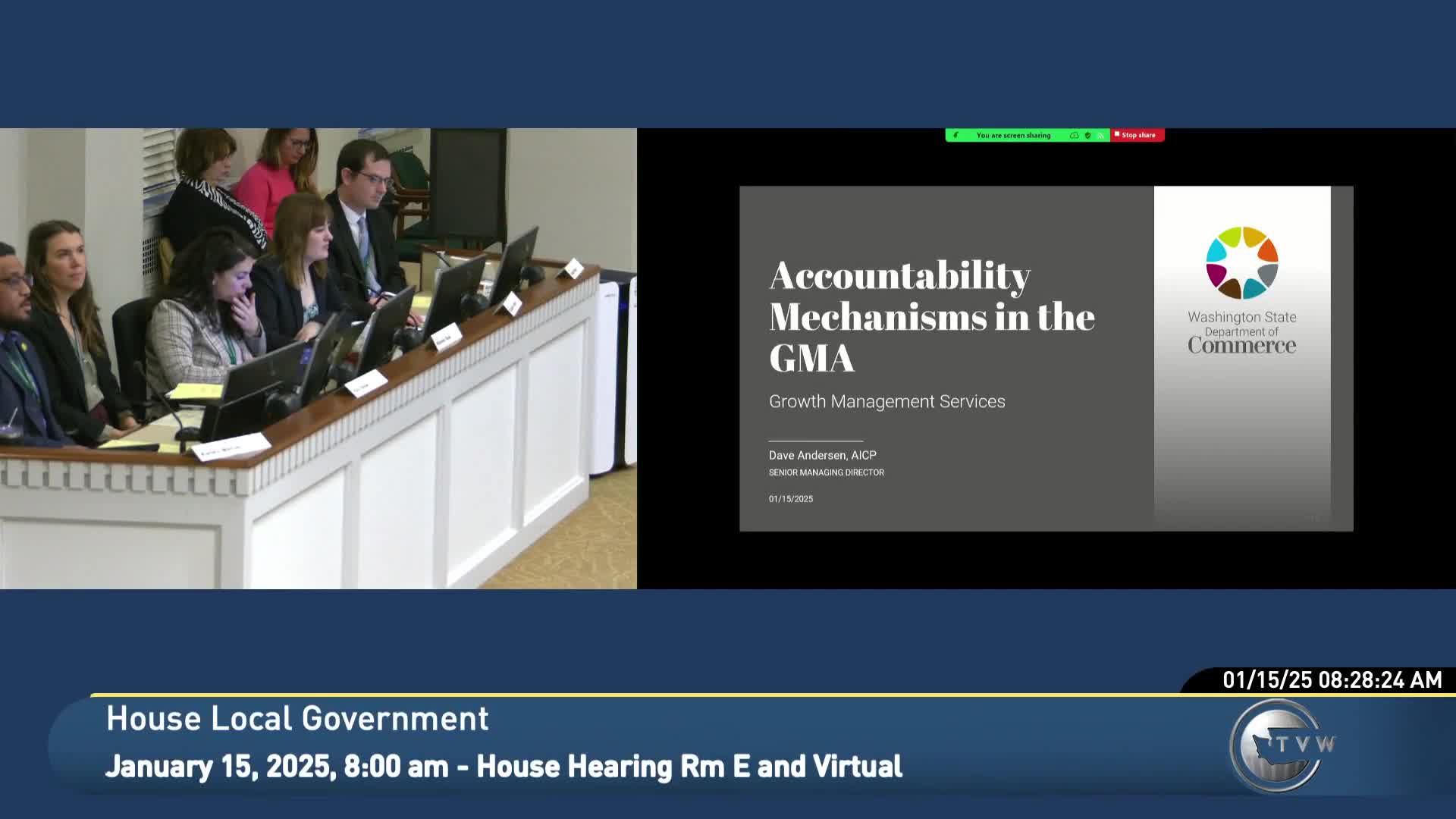Commerce outlines Growth Management Act enforcement, warns litigation slows compliance; Futurewise urges legislative fix
Get AI-powered insights, summaries, and transcripts
Subscribe
Summary
The Department of Commerce told the Local Government Committee that periodic review and appeals-based enforcement under the Growth Management Act can leave jurisdictions out of compliance for years and cut off state funding; Futurewise urged clarifying legislation to prevent older, repealed rules from being shielded from new requirements.
Dave Anderson, managing director of the State Growth Management Program at the Washington State Department of Commerce, told the Local Government Committee that the Growth Management Act's periodic-review and appeals processes create an enforcement system that can take years to resolve and can leave jurisdictions ineligible for certain state funds.
"If a local government has not completed the update on time, they cannot receive funds from certain state infrastructure programs," Anderson said, citing the drinking water state revolving fund, Centennial Clean Water Fund, the clean water state revolving fund, the Public Works Trust Fund and the Recreation and Conservation Office. He added: "It's about $1,000,000,000 a year in funding that local governments lose access to when they fall out of compliance."
Anderson summarized the statutory enforcement ladder: an overdue periodic update makes a jurisdiction ineligible for some grants and loans; a hearings-board order finding noncompliance requires correction before the jurisdiction regains eligibility; the board can also find "invalidity," which suspends enforcement of challenged provisions; and in rare, persistent cases the board may recommend sanctions to the governor. Anderson said such sanctions are extremely rare and have occurred only once in the law's history.
Data presented to the committee showed that petitions to the Growth Management Hearings Board are rare relative to the total volume of local planning actions and that local governments generally prevail at the hearings board. Anderson warned, however, that a handful of technically complex or low-capacity cases can result in jurisdictions remaining out of compliance for a decade or more.
Committee members pressed for ways to shorten the timeline. Anderson described Commerce's work: technical assistance, training, grants to support complex reviews (including for updated housing and climate elements), and publishing advisory lists to support granting agencies. He also noted two legislative options to reduce litigation exposure: mandatory state review (similar to the Shoreline Management Act) or a voluntary certification process like the one used for the new climate element. "That would be another option," he said of voluntary certification, adding the caveat that the fiscal note for mandatory review could be substantial.
Tim, director of planning at the nonprofit Futurewise, addressed committee members after Commerce. Futurewise has participated in appeals and written comment letters on comprehensive plans. Tim warned that a recent Growth Management Hearings Board interpretation allows local governments to repeal noncompliant policies and reinstate older provisions that predate new statutory requirements, and that interpretation "has the potential to shield old policies and regulations from new laws, new housing allocations and new court decisions." Futurewise recommended legislative clarification so newly enacted requirements cannot be effectively sidestepped by reverting to older rules.
What it means: Committee members repeatedly framed the system's practicality as the central problem: litigation is costly and slow, leaving uncertain results for housing and infrastructure projects. Anderson said Commerce can and does provide direct assistance, but the statutory appeals-based enforcement structure and presumption of validity for local actions limit administrative alternatives to litigation.
Next steps: Anderson said Commerce will continue grants and guidance and will consider options for streamlining technical assistance; Futurewise urged legislative changes to remove the loophole it described and protect the intent of recent housing and environmental laws.
